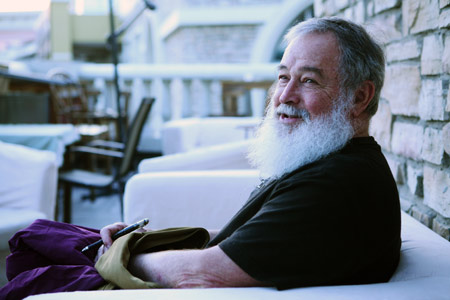Pilgrimage to the East
|
Bill Porter at Dah-Jin-Shan Monastery in Jiangxi Province. Photo: Guo Yingguang. |
With the publication of the Chinese version of Zen Baggage: A Pilgrimage to China last month, American Sinologist and translator Bill Porter's insightful and humorous account of his journey has once again aroused interest in Buddhism among Chinese readers, just as his previous book did.
Porter, also known by his pen name Red Pine, spent six weeks traveling from Beijing to Hong Kong in early 2006, visiting sites associated with the first six Zen patriarchs. He blends Chinese history, Buddhism, his personal story, as well as opinions on the contemporary world from people he interviewed during his travels.
"I took the trip to tell the story of Zen to help Western students understand what I thought of the heart of Zen," Porter told the Global Times. "I don't want them to think Zen is the eggshell. There is something inside the egg that's more important."
Porter's 2007 release of the Chinese version of Road to Heaven: Encounters with Chinese Hermits, traced his visits to China's remote mountainous areas to find Zen hermits. His engaging style and profound knowledge of Buddhism helped many Chinese understand Zen and Taoism in contemporary China in a more personalized way.
After practicing Zen for over 30 years, Porter sees it as an integral part of his daily life and said that practicing Zen is simple.
"Zen is about doing the easiest thing. Being a human being in the modern world is the hardest thing to do. Jianxing (to see your nature) is right there. You don't have to buy it; you can't pay money to get it; you can't get rid of it," he said.
The heart of Zen, the 67-year-old explained, is to practice it daily. "Everything you do is Zen…Be a kind person to others, helping other people, be kind to yourself and letting things go, not being attached to things, like money, wine, cars, beauty. Enjoy them but not be attached to them."
Born in Los Angeles in 1943, Porter said that although he often felt disillusioned about his family's wealthy position in society, his involvement with Buddhism was quite incidental. While studying anthropology in the late 1960s, he came across The Way of Zen by Alan Watts, a famous British philosopher and writer best known as an interpreter of Zen Buddhism. Watts' understanding of Confucianism, Taoism and Zen struck Porter and his interest in the subject was born.
Adding Putonghua to his studies, Porter saw his interest shift from anthropology to Buddhism and in 1972 he went to a monastery in Taiwan and spent over 20 years immersing himself in practice and culture.
 0
0 







